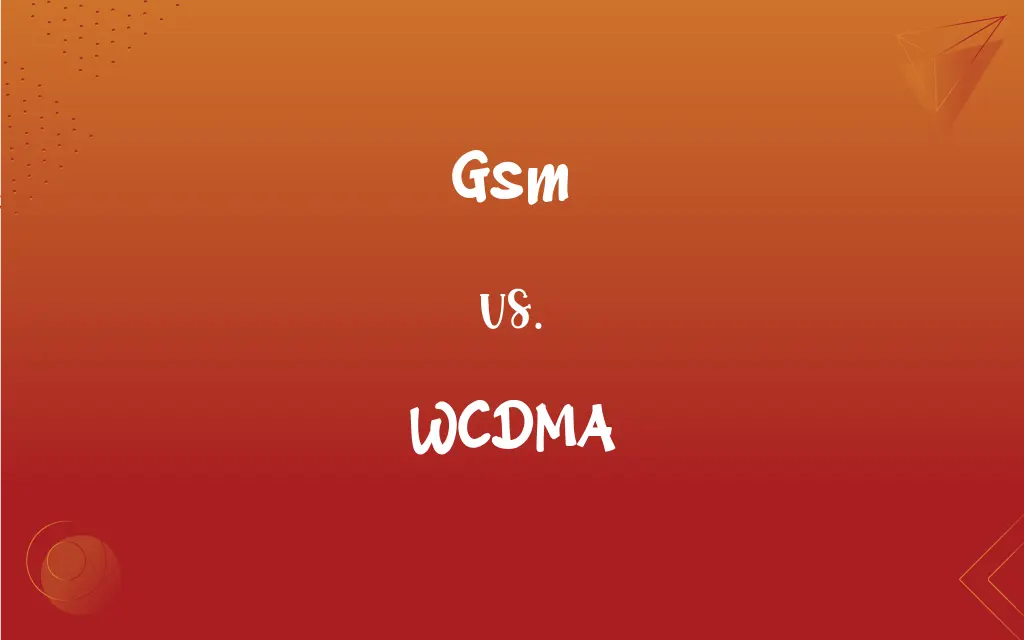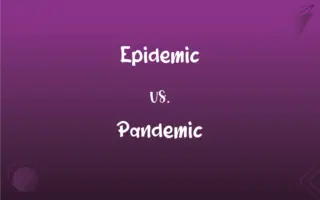GSM vs. WCDMA: What's the Difference?
Edited by Aimie Carlson || By Harlon Moss || Updated on October 10, 2023
GSM (Global System for Mobile Communications) and WCDMA (Wideband Code Division Multiple Access) are cellular technologies where GSM is 2G/3G, and WCDMA is a part of the 3G technology family.

Key Differences
GSM, abbreviated from Global System for Mobile Communications, predominantly operates on the edge technology, while WCDMA, or Wideband Code Division Multiple Access, operates using wider bandwidths.
GSM employs Time Division Multiple Access (TDMA), providing users with timeslots for data transmission, whereas WCDMA utilizes a broader spectrum, allowing multiple users to transmit data simultaneously.
Notably, GSM relies on circuit-switched data transmission, meaning each call occupies its line, whereas WCDMA employs packet-switched data transmission, permitting information to be broken into packets and transmitted over a network.
Interestingly, GSM provides services like call forwarding and SMS, while WCDMA provides additional services, including higher data transmission rates and enhanced quality of multimedia services.
Historically, GSM technology is older and has been utilized for 2G networks, whereas WCDMA, introduced later, is employed in 3G networks, offering improved data and voice services.
ADVERTISEMENT
Comparison Chart
Technology Generation
Primarily 2G, also 3G (with EDGE)
3G
Data Transmission Method
Circuit-switched (CS Data)
Packet-switched (PS Data)
Multiplexing Technique
Time Division Multiple Access (TDMA)
Code Division Multiple Access (CDMA)
Data Transmission Speed
Up to 384 kbps (with EDGE)
Up to 21 Mbps
Frequency Bandwidth
Generally narrower (200 kHz)
Wider (up to 5 MHz)
ADVERTISEMENT
GSM and WCDMA Definitions
Gsm
GSM operates mainly on 850 MHz and 1900 MHz frequency bands in the Americas.
GSM networks in the United States often operate on the 1900 MHz band.
WCDMA
WCDMA stands for Wideband Code Division Multiple Access.
WCDMA allows for high-speed data transmission in 3G networks.
Gsm
GSM stands for Global System for Mobile Communications.
GSM is widely used for 2G cellular networks worldwide.
WCDMA
WCDMA allows for simultaneous communication between users.
WCDMA achieves simultaneous data transmission through the use of spread spectrum technology.
Gsm
GSM utilizes Time Division Multiple Access (TDMA).
With GSM, different calls are assigned different timeslots to prevent interference.
WCDMA
WCDMA is part of the 3G cellular technology family.
WCDMA enabled the advancement of mobile internet speeds and multimedia sharing in the 3G era.
Gsm
GSM encompasses 2G and some 3G technologies.
While known for 2G, GSM is also relevant in some 3G cellular technologies.
WCDMA
WCDMA employs broader bandwidths than its predecessors.
WCDMA utilizes wide channels of up to 5 MHz for data transmission.
Gsm
GSM provides basic data services, like SMS and basic internet access.
Text messages are typically transmitted over GSM networks.
WCDMA
WCDMA enhances multimedia services and data transmission rates.
WCDMA enables users to enjoy smoother video calls and faster internet browsing.
Gsm
An international telecommunications standard for the transmission of voice and data between cellphones and other mobile devices.
Gsm
Init of grams per square metre(unit for measuring the weight of paper)
FAQs
Is WCDMA faster than GSM?
Generally, yes. WCDMA, being a 3G technology, typically offers faster data transmission than GSM.
Can WCDMA phones work on GSM networks?
Many WCDMA phones can also connect to GSM networks, particularly if they are multi-band devices.
What type of technology is GSM?
GSM is primarily known as a 2G technology, though it also encompasses some 3G aspects.
What are common frequencies for GSM?
GSM commonly operates on 850 MHz and 1900 MHz in the Americas, and 900 MHz and 1800 MHz elsewhere.
What does GSM stand for?
GSM stands for Global System for Mobile Communications.
What is EDGE in GSM technology?
EDGE, or Enhanced Data rates for GSM Evolution, is a technology that increases data transmission rates in GSM networks.
Does WCDMA support voice calls?
Yes, WCDMA supports voice calls, often providing clearer audio and improved connectivity compared to earlier technologies.
What is WCDMA?
WCDMA stands for Wideband Code Division Multiple Access, a type of 3G technology.
Is WCDMA compatible with CDMA?
WCDMA and CDMA are different technologies but they share some principles of spread spectrum technology.
What are the advantages of WCDMA?
WCDMA provides faster data transmission, improved voice and multimedia services, and efficient use of bandwidth compared to 2G technologies.
Is WCDMA only used for mobile networks?
Primarily, yes. WCDMA is predominantly utilized for mobile telecommunications networks.
Which countries primarily use GSM?
Many countries globally, including those in Europe, Asia, and Africa, extensively use GSM.
Is WCDMA still used?
Yes, WCDMA is still used in various places as part of 3G networks, although newer technologies are gradually taking precedence.
What data services does GSM offer?
GSM provides various data services including SMS, MMS, and basic internet connectivity through GPRS and EDGE.
Is GSM still used?
Yes, GSM is still used in many regions worldwide, particularly for 2G networks.
Does WCDMA support high-speed data?
Yes, WCDMA supports high-speed data transmission, enabling features like video calling in 3G networks.
Can I use a GSM phone anywhere in the world?
While GSM is globally recognized, network compatibility depends on the device’s supported frequency bands and the roaming agreements.
Can WCDMA be used for 2G?
No, WCDMA is a 3G technology and is not used for 2G networks.
Which came first, GSM or WCDMA?
GSM was developed and implemented first, followed by WCDMA.
Is GSM used worldwide?
Yes, GSM is a widely adopted technology globally, with notable usage for 2G networks.
About Author
Written by
Harlon MossHarlon is a seasoned quality moderator and accomplished content writer for Difference Wiki. An alumnus of the prestigious University of California, he earned his degree in Computer Science. Leveraging his academic background, Harlon brings a meticulous and informed perspective to his work, ensuring content accuracy and excellence.
Edited by
Aimie CarlsonAimie Carlson, holding a master's degree in English literature, is a fervent English language enthusiast. She lends her writing talents to Difference Wiki, a prominent website that specializes in comparisons, offering readers insightful analyses that both captivate and inform.































































